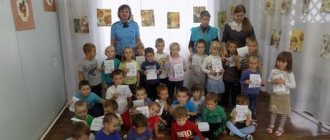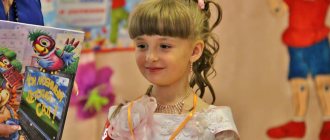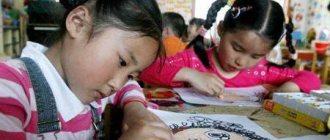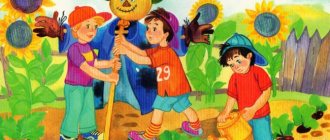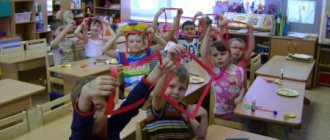Goals: obtaining the maximum possible information about the current state and characteristics of the child’s development; about the specifics and priorities of family education; about the needs and requests of the family in the upbringing and development of the child; about the possibilities of constructive parental participation in the work of the kindergarten.
Creating conditions: you should immediately remember the names and patronymics of your parents and address them that way; It is advisable that there is no barrier (table) separating you from your interlocutor; pay attention to the fact that the height of the chairs is the same; It is most advisable to sit facing each other, and not next to each other, side by side; touching (tactile contacts) is unacceptable; if the conversation does take place at the table, it is advisable that you move all the papers aside; you can’t rush to the phone - you can either turn it off while communicating with your parents, or simply ask them to call you back; It is not recommended to be distracted by work conversations with employees.
Sincere interest without excessive emotionality is desirable.
During communication, it is important to understand what characteristics parents notice in their child, how they evaluate them, and how they react to these manifestations (positively, constructively or destructively). How constructively parents interact with their child at home will determine how easy or, on the contrary, how difficult it will be to interact with him in a kindergarten group. For example, if a young child strives to move independently as much as possible, do the parents understand that for his normal development it is necessary not to limit movement, but to promote it.
If a child at the age of three shows his “terry” negativism, which is again the norm, how do the parents react to it: they help the child constructively overcome difficulties in relationships or try to “re-stubborn”, “break”, subjugate him.
Hence, in the first conversation between the leader and parents, questions may arise:
How do you feel about your baby’s special manifestations: whims, disobedience, etc.? What do you consider the main thing - to make him obedient, subjugating him with your will, or do you give him the opportunity to demonstrate and consolidate independence? What prohibitions exist at home? What the child has already learned: how and what he says; how it moves; what does he like to do, how does he do it? Who takes care of the child, with whom does he spend the most time? What do family members like to do together? What do they pay more attention and time to? What is the best thing to do together? What are they experiencing difficulties with? What do you think are the reasons for these difficulties? What qualities of a child’s personality are teachers advised to focus on and rely on? What advice would you give to us - to all those who will work with a child in kindergarten?
The kindergarten cannot do without promptly informing parents, as well as ongoing assistance from moms and dads.
Have you “appointed” your parents as sponsors of your endeavors and transformations? In this case, before thinking about your (not personal, of course, but production) needs, determine what is most important to them? Their own child, his well-being, his health, but certainly not the problems and needs of a municipal (essentially state) institution.
What is important to you? Receive the necessary assistance in purchasing linoleum (towels, books, stationery, etc.), organize transport for a group outing, accompaniment to the theater and thereby ensure children safety, an interesting and useful pastime, introduction to culture or a healthy lifestyle etc.
Try this strategy:
1. Invite the children to give their opinion about which gender they would like best in the group. Write down everything, even the most ridiculous ideas in your opinion. Don't adjust them, don't smooth them out. Post notes in the reception area.
2. Make a rating assessment: select from children’s fantasies several ideas that are closest to your own (for example: a large carpet - beautiful linoleum - parquet - painted floor), and invite each child in the group to make a choice (put a chip, write your name in column with the selected option).
You will get something like this:
Big
| Beautiful | Parquet | Painted | |
| carpet | linoleum | floor | |
| Lida | Ira | Peter | Valya |
| Dima | Ksyusha | Sonya | |
| Kostya | |||
| 3 | 2 | 1 | 2 |
Together with your children, count what you have accomplished.
3. If possible, offer to draw a group room with a new floor, write down the children’s statements about why it should be exactly like this (what they like, why it is convenient). Hang drawings and statements in the reception area.
4. Write an “open letter” to your parents. For example: “Dear moms and dads, our favorite group is good to everyone - warm, cozy, but the trouble is - more and more often we are tripping over corners and cracks in our old linoleum, broken noses and torn tights have appeared. The new linoleum would allow us to walk without fear or the threat of falling at the most inopportune times. Can you help us? Your beloved children and teachers.”
5. Make an accurate, reasonable cost estimate. Give different prices for linoleum, not forgetting about its quality.
6. Offer an alternative to participation for parents - if not a monetary contribution, then providing transport for searching and delivering linoleum, performing work to free up space and laying linoleum, providing an apparatus for welding linoleum seams, and arranging furniture are no less valuable.
7. Write a long thank you letter to the parents on your behalf and on behalf of your children.
Of course, these options are more labor-intensive than simply writing an ad “Comrade parents, urgently donate 100 rubles to purchase linoleum. Administration,” but the effect will be different. Perhaps not more productive, but more humane, more “continued” - there will be no shame in asking for help in similar situations again and again.
Announcements for parents
Dear moms and dads!
We are trying so hard to be neat that we have run out of scented soap again, and toilet paper will soon be nothing but memories.
Help out urgently!
Your sons and daughters
Dear moms and dads!
There is a situation of emergency in our group - Extreme Snottiness! Early cold weather interferes with our happiness.
We really want our noses to breathe easily and freely.
Please help us urgently seal the windows. We are waiting for your help on Wednesday and Thursday at any time convenient for you.
Don't forget to put extra tissues in our pockets.
Your favorite children
Dear moms and dads!
Every morning we gather on the carpet in a friendly circle, play, share news and plan our day.
To make our “tails” warm and comfortable, please make some pillows for us.
We will be very grateful to you.
Your children We are announcing the “Pillow Girlfriends” competition!
Dear dads!
Now we have a real sandbox in our group. We enjoy playing Easter cakes, building houses and roads.
But the sand always tends to scatter on the floor.
Please help us make sides for our sandbox.
We are waiting for you and will definitely help you.
Your kids
Dad!
The boys and I know the names of many cars - “KAMAZ”, “Tatra”, “Mercedes”, “Chevrolet”. We love to talk about cars, about how we will grow up and drive cars ourselves. In our group we have one book about cars, but we want to see and learn about a variety of them.
Let's bring old magazines "Behind the wheel" to the group? All the boys will be happy, and I most of all.
Your son
We are announcing the “Home Recipes” competition!
Mommy - mommy!
We are learning to cook! We already know how to make sandwiches. Next up is the salad.
We need everything we can use to make salads. And most importantly, simple recipes and help are needed.
Flower daughters
Dear moms and dads!
Our children decided to start a new project and learn as much as possible about the SEAS and marine life.
For this purpose, in our group we have the book “Sea Monsters”, the game “Across the Seas, Across the Waves”, plastic and rubber fish, and an aquarium.
We really need everything that will help us learn more about the seas and those who live there:
• encyclopedias;
• sea shells, pebbles and other small things;
• pictures from magazines and the magazines themselves;
• photos of your summer travels;
• ship models.
We count on you!
Consultation for teachers of preschool educational institutions “Requirements for consultation with parents.”
Requirements for consultation with parents.
Consultation as one of the individual forms of interaction with parents (legal representatives) helps to provide them with timely assistance in raising a child. When planning an individual consultation, the teacher must take into account their needs for certain knowledge. If the consultation occurs on the initiative of the parents (legal representatives) themselves, then it is called spontaneous or unplanned
. If the teacher is not ready to conduct a qualified consultation, then he refers the parents (legal representatives) to other specialists (doctor, educational psychologist, music director, speech therapist, etc.).
A teacher can prepare for a consultation by studying the necessary literature.
If the consultation is planned and carried out on the initiative of the teacher, then it is called planned.
Traditionally, 3–4 consultations per year in each age group are recommended. The topics of consultations are varied. Unlike a conversation, a specialist plays a leading role in a consultation.
During the consultation, it is important to avoid moralizing and edification, and to speak with parents (legal representatives) in an accessible language, showing goodwill. You cannot read the text “from a piece of paper”. The teacher needs to reveal the essence of the question asked, for example: how best to harden a child, how to organize his leisure time in the family, how to answer children’s questions, etc. Consultation can be conducted orally and in writing
. In writing, the teacher can offer parents (legal representatives) reminders, photographs, and bibliography lists.
When conducting a group consultation
The teacher brings together parents (legal representatives) on similar educational problems. In pedagogy this is called a differentiated approach. Thus, a teacher can unite parents (legal representatives) who are faced with the problem of childhood jealousy when there are two or three children in the family. Or invite parents (legal representatives) of frequently ill children to a group consultation and give them comprehensive information on health promotion, hardening, balanced nutrition, and movement development. You can invite a medical professional or a physical education instructor to conduct such a consultation.
Currently, “absentee”
consultations, when the teacher answers questions from parents (legal representatives) in writing. The advantages of preparing and conducting such a consultation are that the teacher, based on the needs of the parents (legal representatives), can prepare a complete answer in advance or forward the question to another specialist, and the parents (legal representatives) can ask questions that are difficult to voice in the presence of other people.
"Helpline"
as a type of pedagogical consultation, it is used in preschool educational organizations for the purpose of a confidential confidential conversation between specialists and parents (legal representatives). This form can be used as a telephone conversation like a hotline. Parents (legal representatives) can call the specified number and chat with specialists on issues that concern them.
Whatever form the consultation takes, it should give parents (legal representatives) something new, useful, and expand their pedagogical knowledge.
Planning group consultations for parents of preschool children
Vera Lipina
Planning group consultations for parents of preschool children
Planning group consultations for parents
Goal: assistance in understanding your own child, in finding and choosing adequate ways, means and methods of education; familiarization with the general patterns of child ; increasing the socio-psychological competence of parents , teaching them communication skills, resolving conflict situations, improving the style of parental behavior .
Tasks: can be classified based on the characteristics of each period of the child’s development and the range of problems that he must solve at each stage independently.
• changing the psychological attitude of teachers and parents on the role of the family in shaping the child’s personality
• diagnostics of the family, the conditions of family education and the needs of parents
• widespread use of the pedagogical capabilities of the parents (rights and responsibilities, interests and capabilities of parents )
• organization of psychological and pedagogical assistance to the family
• the use of active forms of communication with parents , developing pedagogical skills, family communication skills, psychological and pedagogical vigilance
Time: 2 times a month
Duration: 1-1.5 hours in the evening
Effectiveness: as a result of the survey, the specific effects are an increase in their sensitivity to the child, the development of a more adequate understanding of children's capabilities and needs, the elimination of psychological and pedagogical illiteracy, a productive reorganization of the arsenal of means of communication with the child.
the relevance of working with parents in the fact that parents very often spontaneously relate to the process of education. It happens that the reasons for difficulties in communication lie in the position of the parents . Some of them make mistakes in their upbringing, but do not want to see them, correct them, and sometimes simply not notice them, blaming them on the influence of society. parents and the fact of his acceptance in the family as an individual capable of self-development also have a great influence on the development of the child
Long-term planning of group consultations for parents
Month
Participants Topics Purpose Contents
September Parents of the toddler and junior groups . preschool age Child's adaptation to new social conditions.
How to help your child adapt faster to kindergarten. Introduce parents to the adaptation process. Definition of the concept of “adaptation”
, levels of adaptation.
Test for parents
.
” Types of assistance in the adaptation process from parents .
September Parents of all age groups Features and patterns of development of a preschool . Give an idea of the characteristics of children's along the main lines of development. Features of child development, drawing up a portrait with the help of parents . Test drawing for parents “I am a child, an adult, a parent ”
; test interpretation.
October Middle-aged and older parents Children's problems are parents' problems .
Helping parents solve problems in learning, development and communication with the child. Consideration and discussion of anonymous questions, exchange of life experiences, familiarity with psychological and pedagogical literature. Active participation of all parents
October Parents of older age groups Me and my child . Solving problem situations. Introduce popular literature on issues of communication and child development. Give parents to look at their child through the eyes of other parents ; the opportunity to gain new knowledge about child development
November Parents of the toddler and junior groups . preschool age parents need to know about children's stubbornness and capriciousness. Introducing parents to the psychology of raising young children . Define the concepts of capriciousness and stubbornness. Characteristics of the emotional development of a child of early and early preschool age , features of the course of age-related crises . Manifestation of stubbornness and capriciousness in behavior, ways of communicating with a child in such situations, satisfying the need for personal realization of one’s “I”
November Parents of senior and preparatory groups What kind of dads we are , what kind of mothers we are Introducing parents to the psychology of raising children , defining ideal parents Getting to know the characteristics of the existing typology of moms and dads, styles of communication with the child. Carrying out the test method by A. Varga.
Suggestions from parents on the issue of drawing up a portrait of “ideal parents ”
, comparing yourself with the proposed portrait
December Parents of all age groups Relationships in the family. Do you know your child?
Definition of relationships within the family; development of ideas about your child, development of a new style of relationships Test method “Family Circle”
.
Determination of relationships in the family, difficulties, communication style, drawing up an individual portrait of the child based on the observations of the teacher and parents
December Parents of the primary and junior groups . preschool age Emotional
behavioral disorders.
To introduce the characteristics of the emotional development of young children ; disorders in emotional development, methods and methods of correction using non-traditional techniques. Characteristics of emotional development in chronological order. Features of the age period from 0 to 1 year of life, from 2 to 3 years. Difficulties in controlling behavior during these periods. Correction methods, removal of negativity.
January Parents of middle and older age groups How we raise our child (ways of encouragement and punishment)
.
Determining the educational potential of parents using rewards and punishments.
Is it possible to do without punishment? Workshop for parents ; "round table"
; discussion of existing rewards and punishments; the reasons for certain actions, the sources of their origin, the pros and cons of each method, the impact on the personal development of the child. Solving problem situations
January Parents Jr. and average groups Temperamental characteristics, consideration in the upbringing and development of the child Determine the child’s temperament; characteristics of individual characteristics and style of activity, the relationship between the temperaments of parents and children. Test questionnaire (observation)
of parents to determine the temperament of the child. Characteristics of each type of temperament, their relationship, influence on the personal development of the child. Features of behavior, characteristics of the type of activity, emotional state. Games for children of every temperament
February
Parents Jr. , Wed. and senior groups Children's fears The nature of fears. How to help your child overcome his fear. Methods for correcting children's fears. Children's fears at an early age . Carrying out the test methodology Zakharova A. I. explanation of the causes of fears, words, movements that form fears in children . Differences in fears between girls and boys, age periodization of fears. Fears leading to the development of a neurotic personality.
February
Parents of middle and older groups Children's aggressiveness Factors provoking the emergence of children's aggressiveness. Features of behavior and methods of correction through the organization of a game situation. The influence of the family on the emergence of aggressive behavior as a method of defense. Consideration of specific pedagogical situations, cases of manifestation of aggressive behavior towards children, adults, objects. Correction of aggressive behavior, building new relationships, displacing aggressive reactions through non-traditional techniques.
March
Parents of elders and preg . groups Hyperactivity is a disease or behavioral characteristic. Introduction to the concept of MMD, the structural features of the NS in a young child , the relationship between the influence of the NS on the child’s behavioral reactions. Hustlers and mumblers, what they are. Determination of a child’s temperamental characteristics using an observation scheme. A story about MMD using a specific example. Methods of organizing activities and the educational process, taking into account behavioral characteristics, the influence of irritating factors.
March
Parents of all age groups About the characteristics of psychological and social development Individual characteristics of the child’s development. Drawing up a portrait of a child based on observation and psychological testing (at the request of the parents )
Individual
consultations for parents on issues of education, development and upbringing of the child. Individual age characteristics .
Temperamental characteristics, properties of the nervous system, character, types of activities, etc. April
Parents are ready . groups How to choose a school : psychological adaptation Definitions of the concept of “readiness for schooling”
and constituent concepts, the formation of psychological readiness for schooling, types of schools according to areas and training programs.
Familiarity with existing educational programs and their focus. To help parents choose the right direction for their child’s development, based on his development, skills, and knowledge.
Familiarity with the literature on this topic. April
Parents are ready . groups Readiness for school : psychological aspect.
Diagnosis of readiness for school, constituent elements. Child self-esteem as an important element in school readiness. Introduction to test methods. Testing, types of test methods, conversations when admitting a child to school. Recommendations regarding conversations with the teacher, the child’s focus on learning at school. Exchange of experience between parents .
May
Parents of all age groups How to develop a child at home. Why does a child need play? Acquaintance with existing educational programs, types of educational games and their organization. The influence of home development on the formation of a child’s personality. Parents are given ready-made cards with existing games for children of different ages to familiarize themselves with and play with their parents . Discussion of the influence of games on child development. Development of cognitive and mental activity, communication.
May Parents of all age groups Psychological safety of the child. How to spend free time with your child Organizing the child’s independent activities.
Introducing home development programs and getting to know the city. Creative debate about the city holiday, organization of games to get to know the city, familiarization with the educational programs we have for getting to know the city (museums, theaters, libraries, etc.)
. issues of child safety when organizing his free activities at home and on the street, compliance with safety rules.

